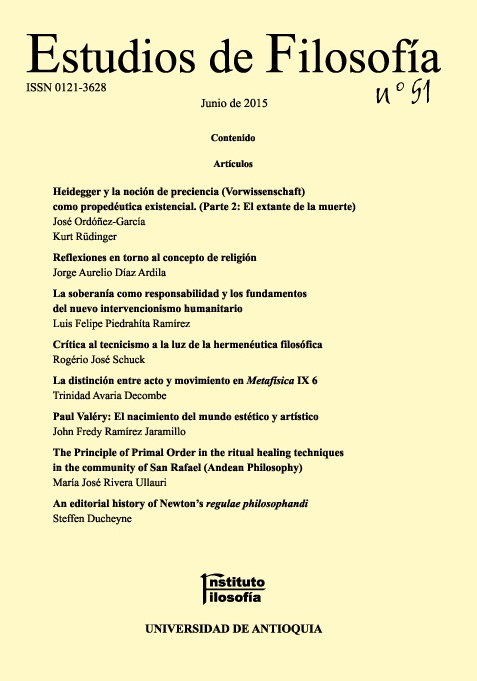La distinción entre acto y movimiento en Metafísica IX 6
DOI:
https://doi.org/10.17533/udea.ef.n51a06Palabras clave:
acto, movimiento, pasaje, actividad, metafísicaResumen
La distinción entre acto y movimiento que enuncia Aristóteles en Metafísica IX 6, 1048b18–35, ha causado una gran polémica entre los intérpretes aristotélicos contemporáneos. En este artículo defendemos que la distinción no está en conflicto con el resto del libro IX, ni con el Corpus Aristotelicum en general. De hecho, aparece también en ética a Nicómaco X 4 y De Anima III 7. Además, sin esta distinción no sería posible entender la inmovilidad del primer motor defendida en Metafísica XII, puesto que allí se afirma que este motor es vida y que su actividad es placer y pensamiento.
Descargas
Citas
Ackrill, J. L. (1965) Aristotle’s Distinction between Energeia and Kinesis. En: R. Bambrough (ed.). New Essays on Plato and Aristotle, Inglaterra, Routledge & Kegan Paul, pp. 121-141.
Aristotelis (1894) Ethica Nicomachea, Ed. crítica de I. Bywater, Nueva York, Oxford University Press.
Aristotelis (1956) De Anima, Ed. crítica de W. D. Ross, Nueva York, Oxford University Press.
Aristotelis (1957) Metaphysica, Ed. crítica de W. Jaeger, Nueva York, Oxford University Press.
Aristóteles (2008a) Ética Nicomaquea, Trad De Julio Pallí Bonet, Madrid, Gredos.
Aristóteles (2008b) Metafísica, Trad. de Tomás Calvo Martínez, Madrid, Gredos.
Aristóteles (2010) De Anima, Trad. de Marcelo Boeri, Buenos Aires, Colihue.
Aristóteles (2012) Física, Libros III-IV, Trad. de Alejandro Vigo. Buenos Aires, Biblos.
Beere, J. (2009) Doing and Being, An Interpretation of Aristotle’s Metaphysics Theta, New York, Oxford University Press.
Burnyeat, M. F. (2008) Kinesis vs. Energeia: Amuchread Passagein (butnotof) Aristotle’s Metaphysics. En: D. Sedley. Oxford Studies in Ancient Philosophy, Nueva York, vol. 34, summer, pp. 219–292.
Cubells, F. (1981) El acto energético en Aristóteles. En: Universidad de Valencia (ed.). Anales del Seminario de Valencia, España, 2a. ed., vol. I.
Frede, M. (1994) Aristotle’s Notion of Potentiality in Metaphysics Theta. En: T. Scaltsas, D. Charles & M.L. Gill (eds.). Unity, Identity and Explanation in Aristotle’s Metaphysics, Nueva York, Clarendon Press, pp. 173-193.
Graham, D. W. (1989) The Etymology of Entelecheia. En: D. H. J. Larmour. The American Journal of Philology, Vol. 110, No. 1, Spring, pp. 73-80.
Kosman, A. (2013) The Activity of Being. An Essay on Aristotle’s Ontology, Cambridge, and London, Harvard University Press.
Makin, S. (2006) Aristotle Metaphysics, Book Theta. New York, Oxford University Press in the Clarendon Press.
Menn, S. (1994) The Origins of Aristotle’s concept of ἐνέργεια: ἐνέργεια and δύναμις. En: R. Polansky (ed.). Ancient Philosophy 14, Mathesis Publications, pp. 73-114.
Ross, W. D. (1997) Aristotle’s Metaphysics, a revised text with introduction and commentary, Oxford New York: Special Edition for Sandpiper Books Ltd., Oxford University Press, Vol. I.
Ross, W. D. (1997) Aristotle’s Metaphysics, a revised text with introduction and commentary, New York: Special Edition for Sandpiper Books Ltd., Oxford University Press, Vol. II.
Ross, W. D. (1998) Aristotle’s Physics, a revised text with introduction and commentary, New York, Oxford University Press.
Yepes, R. (1993) La doctrina del acto en Aristóteles, Pamplona, Eunsa.
Publicado
Cómo citar
Número
Sección
Categorías
Licencia
Derechos de autor 2015 Trinidad Avaria Decombe

Esta obra está bajo una licencia internacional Creative Commons Atribución-NoComercial-CompartirIgual 4.0.
Los autores que publican en Estudios de Filosofía acuerdan los siguientes términos:
1. El Autor retiene el copyright del "Artículo", por el cual se entiende todos los objetos digitales que pueden resultar de la subsiguiente publicación o distribución electrónica.
2. En conformidad con los términos de este acuerdo, el autor garantizará a Estudios de Filosofía como Editor el derecho de la primera publicación del artículo.
3. El Autor le concederá al Editor un derecho perpetuo y no-exclusivo, así como una licencia de la misma clase, de publicar, archivar y hacer accesible el Artículo parcial o totalmente en todos los medios conocidos o por conocerse, derecho y licencia que se conocen como Creative Commons License Deed. Atribución-No Comercial- Compartir igual CC BY-NC-SA o su equivalente que para efectos de eliminar toda duda, le permite a otros copiar, distribuir, y transmitir el Artículo bajo las siguientes condiciones: (a) Atribución: Se deben reconocer los créditos de la obra de la manera especificada por el Autor a Estudios de Filosofía, pero no de una manera que sugiera que tiene su apoyo o que apoyan el uso que hace de su obra. (b) No Comercial: No se puede utilizar el Artículo para fines comerciales.
4. El Autor puede realizar otros acuerdos contractuales no comerciales para la distribución no exclusiva de la versión publicada del Artículo (v. gr. ponerlo en un repositorio institucional o publicarlo en un libro) con la condición de que haga el debido reconocimiento de su publicación original en Estudios de Filosofía.
5. A los Autores se les permite y Estudios de Filosofía promueve publicar en línea (online) la versión pre-impresa del Artículo en repositorios institucionales o en sus páginas web, antes y durante la publicación, por cuanto que puede producir intercambios académicos productivos, así como una mayor citación del Artículo publicado (ver The Effect of Open Access). Dicha publicación durante el proceso de producción y en la publicación del Artículo se espera que se actualice al momento de salir la versión final, incluyendo una referencia a la URL de Estudios de Filosofía.















